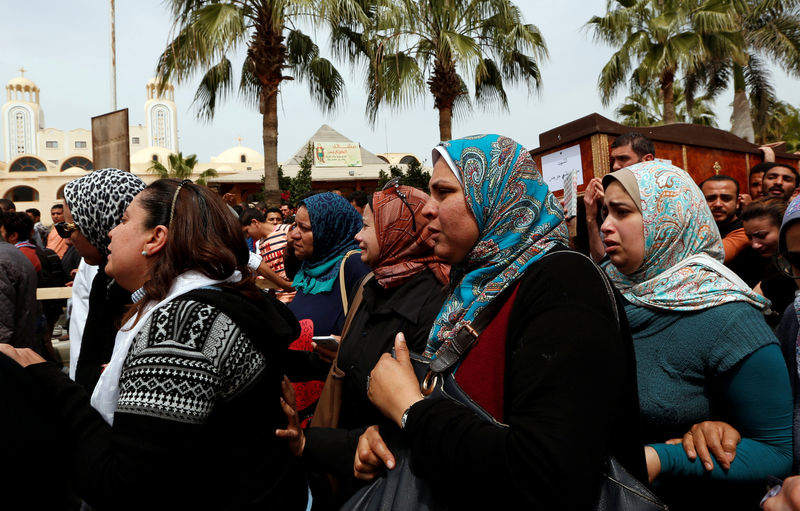By Amina Ismail and Arwa Gaballa
ALEXANDRIA/TANTA, Egypt (Reuters) - Families of victims of Sunday's bombing at Alexandria's Coptic cathedral gathered at the Monastery of Saint Mina under heavy security on Monday as Egypt's cabinet approved a three-month state of emergency ahead of a scheduled trip by Pope Francis.
Hundreds of mourners, many outraged by what they said was the state's failure to keep them safe on one of their holiest days, carried wooden coffins to the beat of drums interrupted by the wails of those dressed in all black.
"Where should we go pray? They are attacking us in our churches. They don't want us to pray but we will pray," said Samira Adly, 53, whose neighbours were killed in the attack.
"Everyone is falling short...the government, the people... nothing is good."
The blast in Egypt's second largest city, which killed 17 including 7 police officers, came hours after a bomb struck a Coptic church in Tanta, a nearby city in the Nile Delta, that took the lives of 28 and wounded nearly 80.
The twin attacks marked one of the bloodiest days in recent memory for Egypt's Christian minority, the largest in the Middle East.
Both attacks were claimed by the Islamic State, which has waged a campaign against Egypt's Christian minority. The Copts, whose presence in Egypt dates to the Roman era, have long complained of religious persecution and accused the state of not doing enough to protect them.
Coming on Palm Sunday, when Christians mark the arrival of Jesus in Jerusalem, the bombings appeared designed to spread fear among the Coptic minority.
"We shouldn't stay quiet at all...it is a security failure..how did the bomb enter when there's security outside the church? They're saying now the metal detector wasn't working," Beshoy Asham, a cousin of a Tanta victim told Reuters.
The attacks also raised security fears ahead of a visit to Cairo by Roman Catholic Pope Francis planned for April 28-29 intended to promote interfaith dialogue between Muslims and Christians.
Coptic Pope Tawadros, who was leading the mass in Alexandria's Saint Mark's Cathedral when the bomb exploded, was not harmed, the Interior Ministry said.
The nationwide state of emergency declared by President Abdel Fattah al-Sisi and agreed by the cabinet on Monday is expected to be approved by parliament within seven days in order to remain in place.
"The armed forces and police will do what is necessary to confront the threats of terrorism and its financing," the cabinet said in a statement. Measures would be taken to "maintain security across the country, protect public and private property and the lives of citizens," it said.
But anger at the state's failure to secure the religious holiday appeared to be on the rise.
Youth gathered at the Alexandria funeral shouted chants rarely heard in a country where protesting has effectively been outlawed and rights activists say they face the worst crackdown in their history.
"Down with any president as long as Egyptian blood is cheap," and "down with military rule!" they yelled.
SOFTER CHRISTIAN TARGET
In Tanta, where many families buried their dead on Sunday, members of the Coptic community expressed anger at the lack of security, saying that despite warnings of an attack, police had not stepped up efforts to protect them.
A senior police official told Reuters a bomb was discovered and disabled near the Tanta church about a week ago.
"That should have been an alarm or a warning that this place is targeted," said 38-year-old Amira Maher. "Especially Palm Sunday, a day when many people gather, more than any other time in the year."
At Tanta University hospital morgue, desperate families were trying to get inside to search for loved ones. Security forces held them back to stop overcrowding, enraging the crowd.
"Why are you preventing us from entering now? Where were you when all this happened?" shouted one women looking for a relative. Some appeared in total shock, their faces pale and unmoving. Others wept openly as women wailed in mourning.
Though Islamic State has long waged a low-level war against soldiers and police in Egypt's Sinai peninsula for years, its stepped up assault on Christians in the mainland could turn a provincial insurgency into wider sectarian conflict.
On Sunday, the group warned of more attacks and boasted it had killed 80 people in three church bombings since December.
"They want to use Islam to tear us apart. We are brothers and sisters and religion for God is Islam, but Christians are our brothers and sisters," said Nematalla from Cairo.
A Muslim pedestrian in Cairo wept over the church victims.
"These people are Egyptian....These people are our brothers and sisters and we love them," said Mohamed Zeinhom.
Security analysts said it appeared that Islamic State, under pressure in Iraq and Syria, was trying to widen its threat and had identified Christian communities as an easier target.
"ISIS are deeply sectarian, that's nothing new, but they have decided to re-emphasize that aspect in Egypt over the past few months," said H.A. Hellyer, senior non-resident fellow at the Atlantic Council and the Royal United Services Institute.

"Christian targets are easier -- churches are far more difficult to fortify than say an army barracks or a police station. It's a disturbing development because it indicates we have the possibility of repeated and continued attacks against soft targets."
(additional reporting by Osama Naguib and Mostafa Salem; writing by Asma Alsharif; editing by Luke Baker, Sonya Hepinstall, Anna Willard)